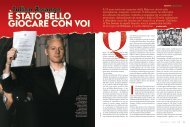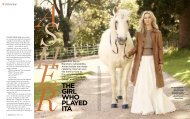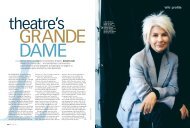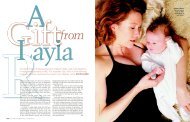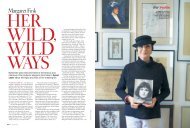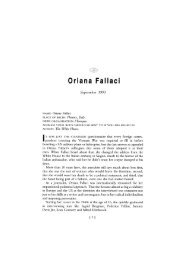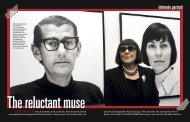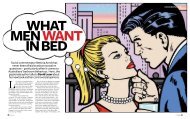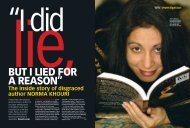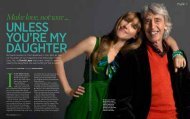Superstar housewife Dame Edna Everage has taken the - David Leser
Superstar housewife Dame Edna Everage has taken the - David Leser
Superstar housewife Dame Edna Everage has taken the - David Leser
You also want an ePaper? Increase the reach of your titles
YUMPU automatically turns print PDFs into web optimized ePapers that Google loves.
HOOK LINE & SINKER<br />
its earliest taste of Barry playing <strong>the</strong> role of sardonic pantomime<br />
dame. They went into raptures. “You could hear <strong>the</strong> whoosh<br />
of laughter,” Barry <strong>has</strong> said. “No one had really talked about<br />
Australian houses before.”<br />
In 1958, Barry Humphries released a record, Wildlife in<br />
Suburbia, which had monologues from Sandy Stone – his sad, loveless<br />
Beckett-like character – on <strong>the</strong> A-side, and from <strong>Edna</strong> <strong>Everage</strong> on <strong>the</strong><br />
B-side.<br />
“It was a landmark cultural experience,” says writer Richard Neville. “It<br />
was a shaft of light where it had never shone before.<br />
“Most Australian (comedy) had been pretty old-fashioned<br />
– Dad and Dave kind of stuff – and <strong>the</strong>n suddenly you had this<br />
piercing, vicious, intellectual exposé of this country that we loved<br />
and hated but didn’t know why. It was <strong>the</strong> cleverest piece of piss-<br />
taking I’d ever heard. And <strong>the</strong>n watching that little cult moment getting<br />
out into <strong>the</strong> world, going from Moonee Ponds to Broadway, well, that<br />
was just total genius.”<br />
<strong>Edna</strong> <strong>Everage</strong> was supposed to be a one-night stand. Instead, she’s<br />
been around for 46 years. In <strong>the</strong> United Kingdom, she is regarded as a<br />
<strong>the</strong>atrical phenomenon – <strong>the</strong> only solo act to fill <strong>the</strong> prestigious Theatre<br />
Royal since it opened for business in 1663.<br />
She <strong>has</strong> had her own television talk show, opened Harrods<br />
sales, sung in <strong>the</strong> Royal Albert Hall, been put on display at<br />
Madame Tussauds, met <strong>the</strong> royal family, had badges, mugs and<br />
spectacles made in her honour and seen her 1989 autobiography,<br />
My Gorgeous Life, climb onto <strong>the</strong> best-seller list – in <strong>the</strong> non-<br />
fiction category! She’s also played to packed houses in Ireland, Scandinavia,<br />
Germany, Hungary, Belgium and <strong>the</strong> Ne<strong>the</strong>rlands. Cementing her<br />
place as a pop culture icon was <strong>Edna</strong>’s guest appearance on Ally McBeal<br />
in <strong>the</strong> US this year.<br />
Of course, <strong>Edna</strong> was never Barry Humphrey’s only comicgrotesque<br />
character. Bazza McKenzie and later <strong>the</strong> even more<br />
vulgar Sir Les Patterson, were responsible for embarrassing an entire nation<br />
for many years, but also for reviving a language thought moribund. From<br />
<strong>the</strong>ir foul mouths, urinating became “pointing <strong>the</strong> Percy to <strong>the</strong> porcelain”,<br />
thirst turned into “dry as a dead dingo’s donger”. Vomiting became<br />
“chundering” or “yodelling on <strong>the</strong> lawn”. Bazza McKenzie was <strong>the</strong> appalling<br />
ingenue abroad; Les, <strong>the</strong> yobbo spiv with <strong>the</strong> taipan in his trousers.<br />
And <strong>the</strong>n, of course, <strong>the</strong>re was Sandy Stone, <strong>the</strong> Australian Charlie<br />
Chaplin figure who died and came back as <strong>the</strong> ghost of <strong>the</strong> suburbs. He<br />
talked endlessly to no one from his rocking chair, a plaintive, dried-up<br />
voice from an unexamined life. Sandy Stone was <strong>the</strong> part of Barry that<br />
never left home.<br />
“I still enjoy him very much,” he says now, unaware that his friend,<br />
antiquarian bookseller Nicholas Pounder, <strong>has</strong> already regaled me with<br />
an hilarious account of a trip to Bronte Beach in Sydney last year, where<br />
Barry turned himself into Sandy Stone and walked through <strong>the</strong> local cemetery<br />
in his slippers and dressing gown, muttering to himself. “Jesus, Mr<br />
Humphries,” said a wild-eyed drunk from underneath his cardboard hut<br />
when he saw <strong>the</strong> ghost himself. “Welcome back to Australia.”<br />
In o<strong>the</strong>r words, <strong>Edna</strong> <strong>Everage</strong> was far from Barry’s only alterego.<br />
She just happened to be his most popular and powerful<br />
one. In her 46 years, she’d grown from a stick-like figure into a<br />
colossus bestriding <strong>the</strong> globe. She’d been cross-fertilised with <strong>the</strong> Queen,<br />
with Streisand, with Madonna. She’d become a dame (courtesy of Gough<br />
Whitlam). A superstar <strong>housewife</strong>. A megastar. She’d <strong>taken</strong> on a life of her<br />
own – her own blood stream, her own metabolism – so much so that to<br />
address <strong>Edna</strong> as Barry invariably invited a polite rebuke, along <strong>the</strong> lines<br />
of “Barry is not here”.<br />
So, naturally, this was <strong>the</strong> challenge facing <strong>the</strong> profile writer.<br />
To try and find, amidst all <strong>the</strong> disguises, <strong>the</strong> real Barry Humphries;<br />
to go beyond what we thought we already knew. We knew,<br />
for example, that Barry had been married four times and that<br />
his current wife, Lizzie Spender, was <strong>the</strong> daughter of <strong>the</strong> late,<br />
celebrated English poet, Sir Stephen Spender. We knew that he had four<br />
children from his second and third marriages, Tessa, now 38, Emily, 36,<br />
Oscar, 20, Rupert, 19, and four grandchildren.<br />
We knew, also, that alcohol had nearly destroyed him in <strong>the</strong> 1960s,<br />
but that after legendary bouts under tables, in <strong>the</strong> wrong people’s beds,<br />
in psychiatric hospitals, nursing homes and even prison on one occasion,<br />
he finally discovered that life was – and is – possible without <strong>the</strong> booze.<br />
Beyond that, what we had were mainly assumptions, <strong>the</strong> most crucial<br />
one being that he apparently hated Australia, o<strong>the</strong>rwise why would he<br />
satirise us so savagely, for so long? The o<strong>the</strong>r assumption being that he<br />
allowed his prejudices to live and brea<strong>the</strong> through his characters, and<br />
that, if you peeled away <strong>the</strong> layers of <strong>Edna</strong> <strong>Everage</strong>, you’d eventually come<br />
face-to-face with Barry Humphries himself.<br />
When I meet <strong>Edna</strong> for <strong>the</strong> first time she <strong>has</strong> just finished<br />
pronouncing on <strong>the</strong> virtues of “mo<strong>the</strong>r’s spit” products to a<br />
Denver television audience, and to Kirk, <strong>the</strong>ir ra<strong>the</strong>r startled-<br />
looking show business reporter.<br />
“When you were little Kirk, and you fell over, did your mo<strong>the</strong>r<br />
lick her handkerchief to wipe your knee? Did she? Well, <strong>the</strong>re’s<br />
something in mo<strong>the</strong>r’s spit. There’s an enzyme ... and my mo<strong>the</strong>r<br />
is in a facility for old people. She’s very, very old and she’s<br />
now drooling ... in commercially viable quantities. She’s yielding<br />
several barrels a day, and we’re harnessing this, and I’m making a whole<br />
range of mo<strong>the</strong>r’s spit products.<br />
“We have <strong>the</strong> healing properties of that little wet hankie and I’m making<br />
bath gel, beautiful night cream, even a scent ... ”<br />
After <strong>Edna</strong> <strong>has</strong> dispensed with poor Kirk, she takes me to her<br />
hotel room where, behind closed doors, she changes into a man<br />
in pants and a crumpled blue denim jacket. Barry Humphries<br />
appears a little worse for wear. He <strong>has</strong> a cold. He <strong>has</strong>n’t slept well.<br />
He’s on a deadline to finish <strong>the</strong> second volume of his autobiography.<br />
He <strong>has</strong> a show tonight here in Denver and <strong>the</strong> set is still in flood-<br />
ravaged Houston. Unlike <strong>Edna</strong>, this 67-year-old man of culture<br />
and deep learning is too polite to send his interlocutor packing,<br />
and so he agrees, reluctantly, to join me in this charade of<br />
disclosure called <strong>the</strong> interview, where I begin by asking him what motivates<br />
his humour.<br />
“I’m always looking for absurdity,” he replies, “or some<br />
pretension or some grandiosity. Admittedly, my sense of humour fails<br />
me, as every comedian’s sense of humour fails <strong>the</strong>m, in regard to myself<br />
... But on <strong>the</strong> whole, <strong>the</strong>y’re what I look for. Remember, comedians never<br />
analyse what <strong>the</strong>y do. It’s just what we do. There’s no explanation for it.<br />
The world is not going to be any richer or less rich because of us. We just<br />
happen to do this thing. It’s a method of survival ... I just found it was a very<br />
useful raft on which to cling in order to survive <strong>the</strong> ‘50s.”<br />
But what about now? Do you find a kind of peace in <strong>the</strong><br />
characters you play? “Well I do find peace in <strong>the</strong> stage ... I really<br />
find <strong>the</strong> stage <strong>the</strong> most comfortable refuge <strong>the</strong>re is ... I find refuge<br />
from – dare I say it – people like you ... please don’t take offence<br />
... I just find that when I’m on <strong>the</strong> stage, I have two-and-a-half hours<br />
where <strong>the</strong> phone is not going to ring. I can tell <strong>the</strong>m a story, really,<br />
in a funny way and I can have an interchange with a group of<br />
people who pay me <strong>the</strong> complement of buying tickets. And that’s kind<br />
of what I do.<br />
“I find <strong>the</strong> <strong>the</strong>atre a very interesting place – much more<br />
interesting than television or film, because people want to go <strong>the</strong>re. They<br />
have to turn off <strong>the</strong> television, get in a car, come into town, buy a meal, pay<br />
for a car park, come out of a coma and sit in some building consecrated<br />
to a communal purpose, to a sort of artistic purpose. This is an important<br />
act and need in people ...<br />
“And to see <strong>the</strong>m examine <strong>the</strong>ir lives suddenly. They look very shocked<br />
when you speak to <strong>the</strong>m because <strong>the</strong>y’re used to being passive witnesses<br />
of an entertainment, not participants. So when <strong>the</strong>y’re asked to describe,<br />
for example, <strong>the</strong>ir house, <strong>the</strong>y can’t remember what <strong>the</strong>ir house is like.”<br />
“Maree darling, is your home detached? (Silence) You<br />
▲<br />
THE AUSTRALIAN WOMEN’S WEEKLY – OCTOBER 2001 303



